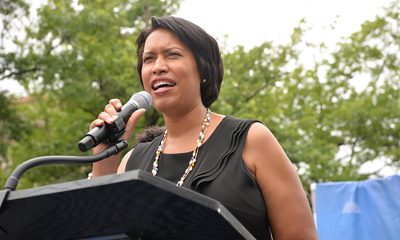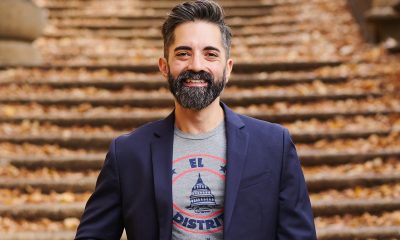National
LGBTQ groups participate in March on Washington
60th anniversary commemoration of historic event draws thousands
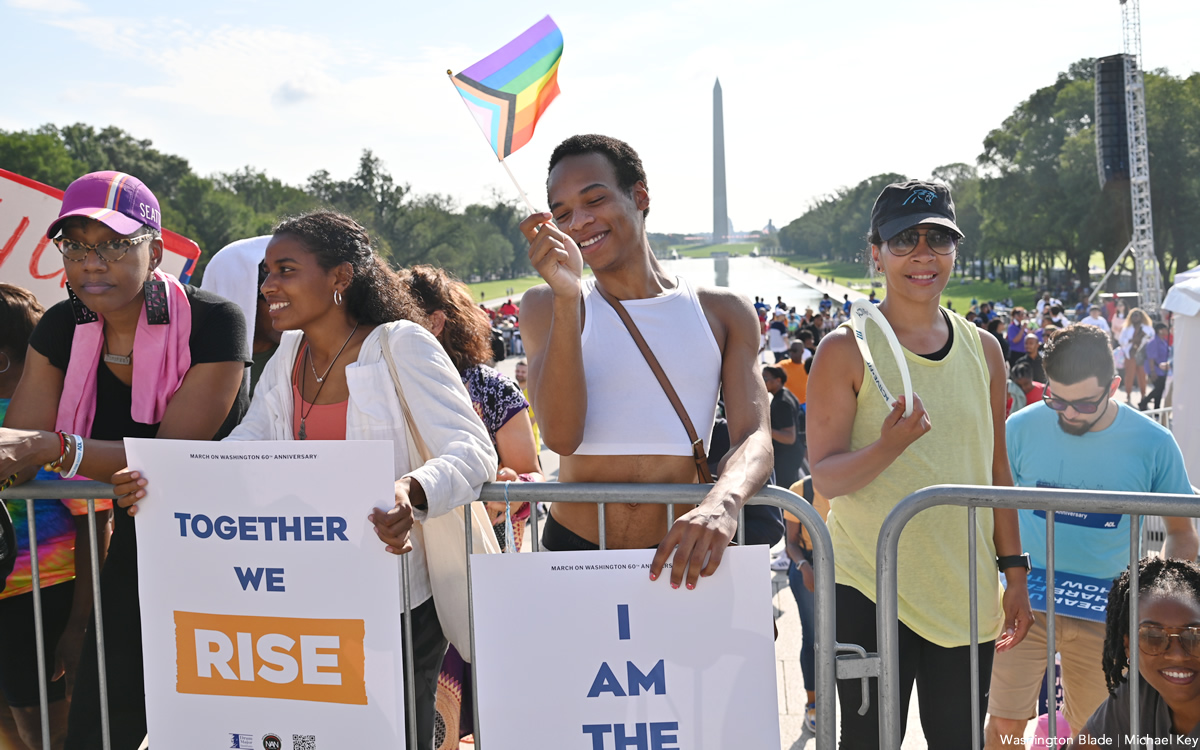
Thousands of activists and spectators attended the 60th Anniversary March on Washington on Saturday, Aug. 26. Advocates and leaders from labor unions, faith communities, political groups, and community organizations traveled to the Lincoln Memorial at the historic site of Martin Luther King Jr.’s 1963 “I Have a Dream” speech to call for a continuation in the fight for racial justice and equality.
Several speakers at the rally included a call for LGBTQ equality as an integral part of the broader fight for social justice. Leaders of LGBTQ organizations were among the speakers at the Lincoln Monument. Notable LGBTQ speakers included activists Ollie Henry and Hope Giselle representing the National Black Justice Coalition; Kierra Johnson, executive director of the National LGBTQ Task Force; Stacey Stevenson, president and CEO of Family Equality; and Kelley Robinson, president of the Human Rights Campaign.
Several speakers remarked upon the legacy of out gay activist and leader Bayard Rustin, the architect of the original 1963 March on Washington for Jobs and Freedom.
“I’m honored to be here among so many leaders, but especially the legacy of Bayard Rustin,” HRC President Robinson said in her remarks. “Bayard Rustin was the lead organizer for the first March on Washington and he led proudly and loudly as an out gay Black man, y’all. And I say that because the truth is that lesbian, gay, bi, trans and queer people: We are here today and we have always been here.”
“I have a simple request,” Robinson continued. “If you have a queer or trans child: love them and love them completely. If you have a Pride flag: fly it, waive it, and waive it proudly. And if you’ve got a vote: by God, use it.”
Task Force Executive Director Johnson spoke about the challenges facing members of the LGBTQ community, particularly those who live in the intersections of identities that face discrimination.
“Our lives are literally under attack,” Johnson said. “Our transgender, genderqueer and non-binary children are being targeted, religion has been weaponized to deny care and rights to our loved ones. The erosion of voting rights, the dehumanization of immigrants, the policing of Black and brown bodies and attempts to erase our contributions from the history books. And yet, here we are.”
Johnson continued, “We deserve congressional leaders that will pass essential, life-saving and affirming legislation like the EACH Act, the George Floyd Justice in Policing Act, the John Lewis Voting Rights Act, the Renewing Immigration Provisions Act, and the expansion of civil rights in passing the Equality Act.”
In the pre-program speeches, non-binary activist Ollie Henry remarked, “The March on Washington has always been a march towards. A march towards actualizing the dreams our ancestors laid into each marble slab placed on this stolen soil. They had a dream to be seen, accepted and celebrated just as they are. Decades ago, queer folks in the movement were kept to the outskirts of our community’s garden. But today, we stand in the sunlight.”
Hope Giselle of Get Phluid and the GSA Network addressed the crowd.
“As I stand here, where 60 years ago someone believed in a dream, as a Black trans woman, my dream is to be able to walk around amongst my people at the very cookout that so many are invited to who don’t belong and feel safe,” she said. “My dream is that when I walk into my home, when I see the faces of the people that look like me, they are not turned up in disgust because of the way that I show up and that the contributions that I and the rest of my community make toward the betterment of Blackness is accepted as valuable.”
“To stand on the steps where this beautiful speech was given and be acknowledged in the fullness of who I am both being Black and being a trans woman at the same time feels amazing,” Giselle told the Blade. “But I also feel like it’s commemorative of the message that Dr. King gave, which is one, I believe, about solidarity of all people and about the coming together of everyone for the rights of folks.”
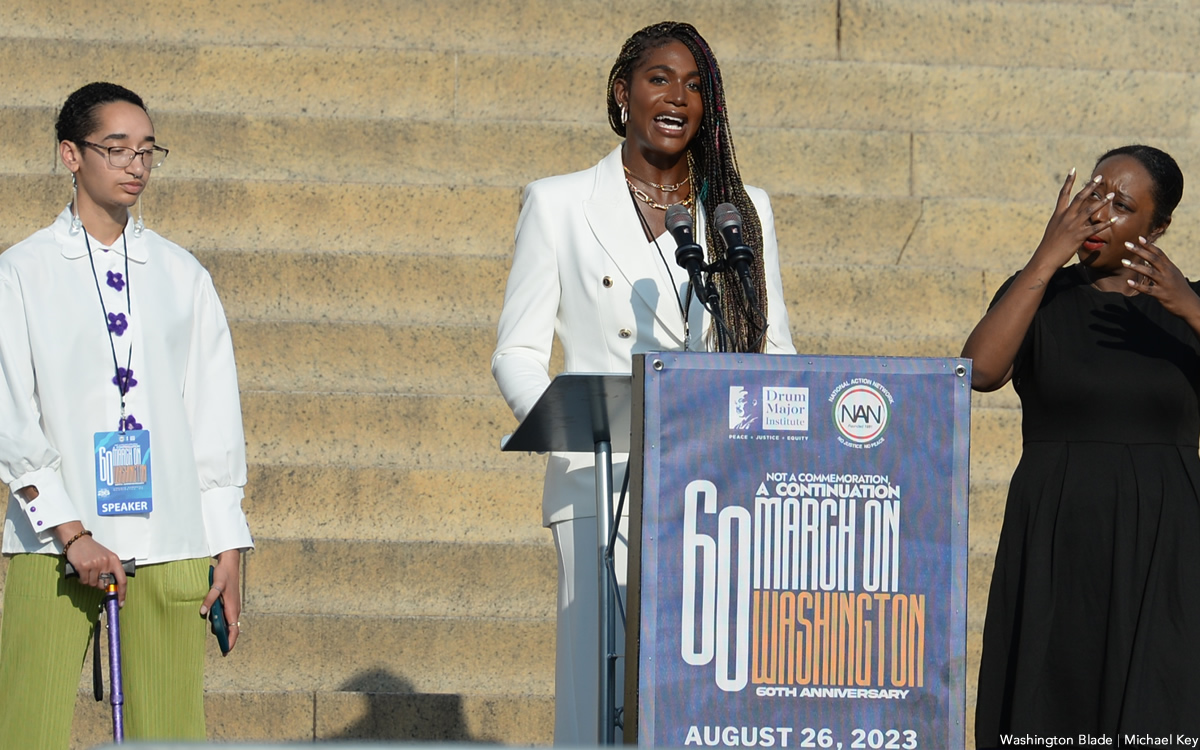
Following the speeches, activists held signs and chanted in a march beginning at Lincoln Circle proceeding south on 23rd Street, N.W. The march continued along Independence Avenue and concluded at West Potomac Park near the Martin Luther King, Jr. Memorial.
Covering the 60th Anniversary March on Washington for @WashBlade . Kierra Johnson of @TheTaskForce speaking: pic.twitter.com/WDsFOQxPfr
— Michael Patrick Key (@MichaelKeyWB) August 26, 2023
California
LGBTQ community calls out Radio Korea over host’s homophobic comments
Station acknowledged controversy, but skirted accountability
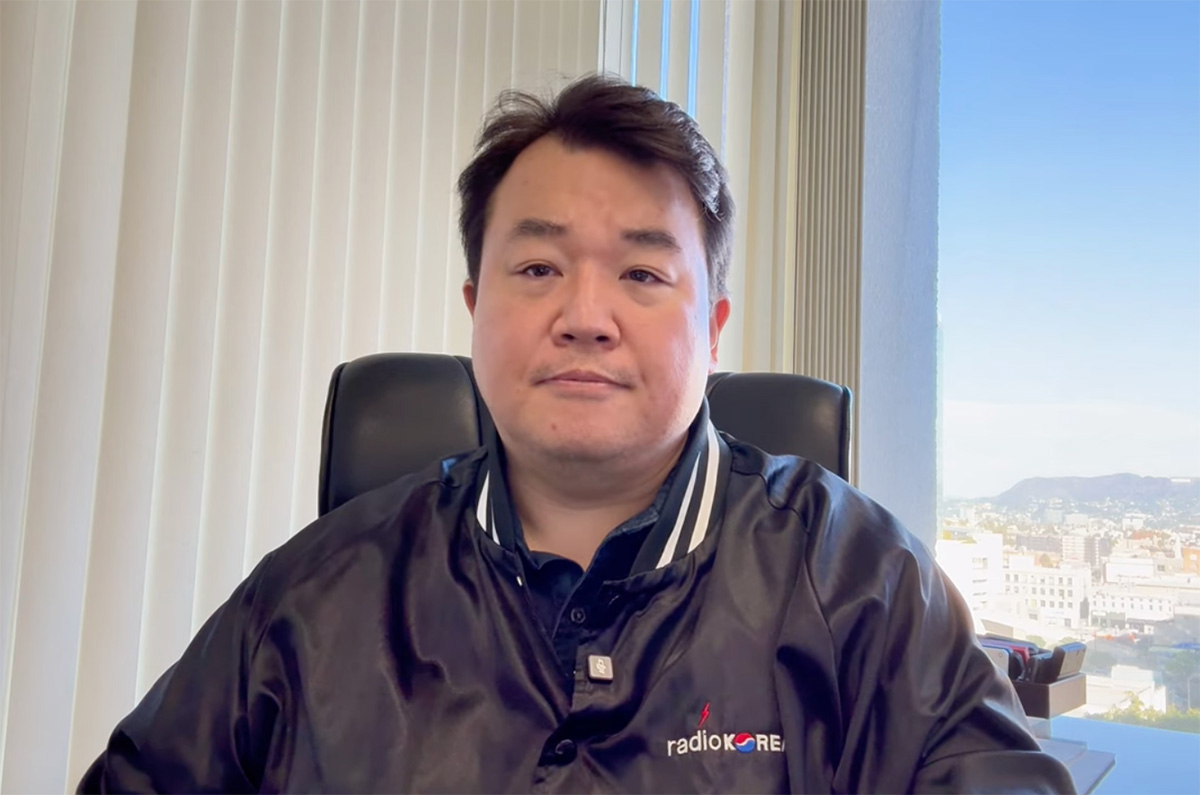
On Monday, Nov. 3, Radio Korea aired its regular morning talk show program, where one of its hosts, Julie An, discussed her lack of support for the LGBTQ community, citing her religious beliefs. She also went on to comment that gay people spread HIV and AIDS, and that conversation therapy — which has been linked to PTSD, suicidality, and depression — is a viable practice. Clips of this have since been taken down.
Radio Korea offers Korean language programming to engage local Korean American and Korean immigrant community members. Its reach is broad, as Los Angeles is home to the largest Korean population in the U.S, with over 300,000 residents. As An’s words echoed through the station’s airwaves, queer Korean community members took to social media to voice their concern, hurt, and anger.
In a now-deleted Instagram post, attorney, activist, and former congressional candidate David Yung Ho Kim demanded accountability from the station. Writer and entertainer Nathan Ramos-Park made videos calling out Radio Korea and An, stating that her comments “embolden” people with misinformation, which has the ability to perpetuate “violence against queer people.”
Community health professional Gavin Kwon also worries about how comments like An’s increase stigma within the Korean immigrant community, which could lead to increased discrimination against queer people and their willingness to seek health care.
Kwon, who works at a local clinic in Koreatown, told the Los Angeles Blade that comments like An’s prescribe being gay or queer as a “moral failure,” and that this commonly-held belief within the Korean immigrant community, particularly in older generations, strengthens the reticence and avoidance clients hold onto when asked about their gender or sexual orientation.
“When you stigmatize a group, people don’t avoid the disease — they avoid care,” Kwon explained. “They avoid getting tested, avoid disclosing their status, and avoid talking openly with providers. Stigma pushes people into silence, and silence is the worst possible environment for managing any infectious disease.”
For weeks, Radio Korea did not offer a direct response to the public criticism. Its Instagram feed continued to be updated with shorts, featuring clips of its various hosts — including An.
On Friday, Radio Korea CEO Michael Kim released an official statement on the station’s YouTube page. In this video, Michael Kim stated that An’s comments “included factual inaccuracies” and that the station “does not endorse or share the personal opinions expressed by individual hosts.” Michael Kim also stated that Radio Korea “welcomes members of the LGBT community to share their perspectives” in order to deepen understanding through dialogue.
Afterwards, Michael Kim continued that though he acknowledges the “pain” felt by queer community members, he concluded: “I don’t think Radio Korea needs to apologize for what was said any more than Netflix should apologize for what Dave Chappelle says, or any more than Instagram or TikTok should apologize for what people say on their platforms.”
Michael then offered a justification that An’s statements were “not part of a news report,” and that he was “disappointed” that David Yung Ho Kim, specifically, had been vocal about An’s comments. Michael Kim stated that he was the first person to interview David Yung Ho Kim in 2020 during his congressional campaign, and that he had provided the candidate a platform and opportunity to educate listeners about politics.
“After all these years, the support Radio Korea has given him,” said Kim, “the support I personally gave him, even the support from other Radio Korea members who donated or even volunteered for him — he dishonestly tried to portray Radio Korea as being an anti-gay organization.”
Michael Kim went on to criticize David Yung Ho Kim’s purported “hurry to condemn others,” and also questioned if David has disowned his father, who he states is a pastor. “What kind of person is David Kim, and is this the kind of person we want in Congress?” Michael Kim asked viewers, noting that Koreatown is “only about three miles from Hollywood, and some people just like to perform.”
At the end of the video, Michael Kim stated that his duty is to guard the legacy of the station. “My responsibility is to protect what was built before me and ensure that Radio Korea continues serving this community long after today’s momentary controversies disappear,” he said.
For community members and advocates, this response was unsatisfactory. “The overall tone of the statement felt more defensive than accountable,” Kwon wrote to the Blade. “Instead of a sincere apology to the LGBTQ+ community that was harmed, the message shifts into personal grievances, political dynamics, and side explanations that don’t belong in an official response.”
Michael Kim’s portrayal of the criticism and calls to action by community members as a “momentary controversy” paints a clearer picture of the station’s stance — that the hurt felt and expressed by its queer community members is something that will simply pass until it is forgotten. An continues to be platformed at Radio Korea, and was posted on the station’s social media channels as recently as yesterday. The station has not outlined any other action since Michael Kim’s statement.
U.S. Military/Pentagon
Pentagon moves to break with Boy Scouts over LGBTQ and gender inclusion
Leaked memo shows Hegseth rejecting Scouting America’s shift toward broader inclusion
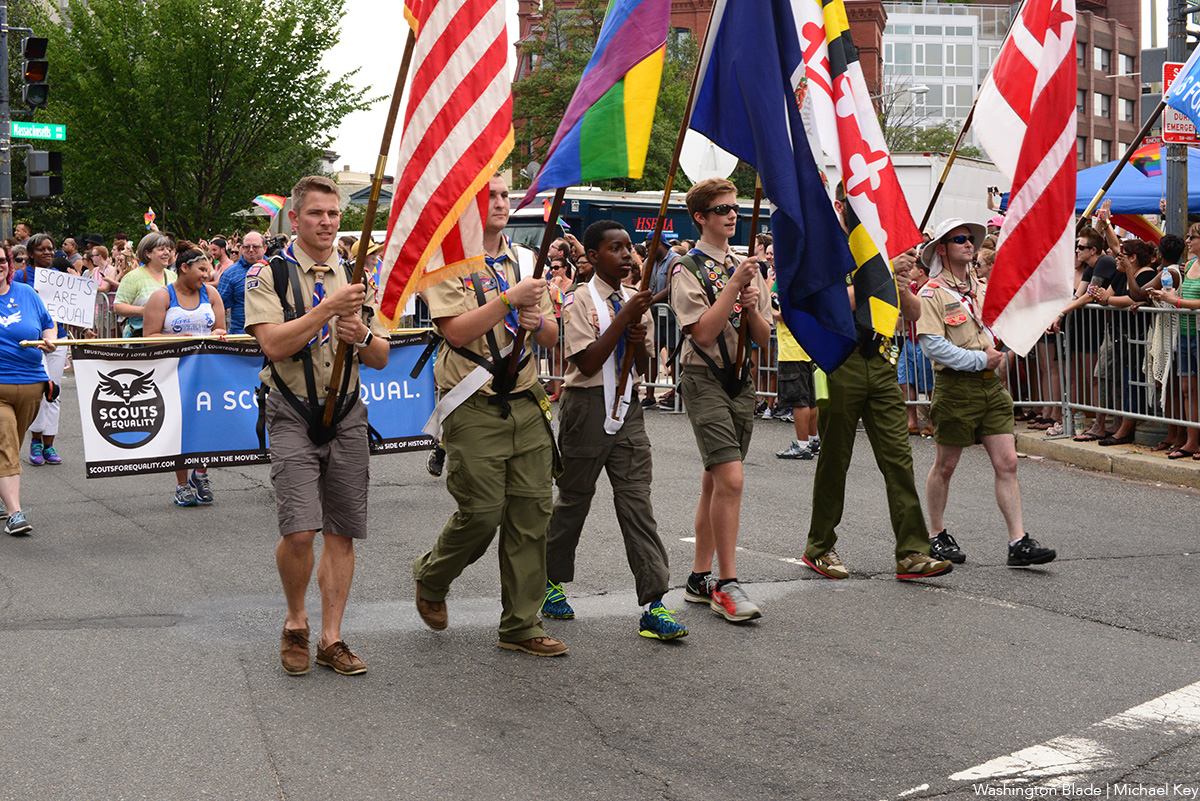
The Pentagon is preparing to sever its longstanding partnership with the Boy Scouts of America, now known as Scouting America.
In a draft memo to Congress obtained by NPR, Defense Secretary Pete Hegseth criticizes the organization for being “genderless” and for promoting diversity, equity, and inclusion.
“The organization once endorsed by President Theodore Roosevelt no longer supports the future of American boys,” Hegseth wrote, according to Defense Department sources.
Girls have been eligible to join Cub Scouts (grades K–5) since 2018, and since 2019 they have been able to join Scouts BSA troops and earn the organization’s highest rank of Eagle Scout.
A statement on the Scouting America website says the shift toward including girls stemmed from “an expanding demand to join the Boy Scouts” and a commitment to inclusivity. “Throughout the late 20th and early 21st centuries, it has undergone significant changes to become more inclusive of the adult staff and volunteers that drive its programming as well as of scouts and their families,” the organization says.
Part of that broader push included lifting its ban on openly gay members in 2014 and on openly gay adult leaders in 2015.
Once the Pentagon finalizes the break, the U.S. military will no longer provide medical and logistical support to the National Jamboree, the massive annual gathering of scouts in West Virginia that typically draws about 20,000 participants. The memo also states that the military will no longer allow scout troops to meet on U.S. or overseas installations, where many bases host active scout programs.
Hegseth’s memo outlines several justifications for the decision, arguing that Scouting America has strayed from its original mission to “cultivate masculine values” by fostering “gender confusion.” It also cites global conflicts and tightening defense budgets, claiming that deploying troops, doctors and vehicles to a 10-day youth event would “harm national security” by diverting resources from border operations and homeland defense.
“Scouting America has undergone a significant transformation,” the memo states. “It is no longer a meritocracy which holds its members accountable to meet high standards.”
The Pentagon declined NPR’s request for comment. A “War Department official” told the outlet that the memo was a “leaked document that we cannot authenticate and that may be pre-decisional.”
The leaked memo comes roughly one month after nearly every major journalism organization walked out of the Pentagon in protest of new rules requiring reporters to publish only “official” documents released by the department — effectively banning the use of leaked or unpublished materials.
President Donald Trump, who serves as the honorary head of Scouting America by virtue of his office, praised the Jamboree audience during his 2017 visit to West Virginia. “The United States has no better citizens than its Boy Scouts. No better,” he said, noting that 10 members of his Cabinet were former Scouts.
Hegseth was never a scout. He has said he grew up in a church-based youth group focused on memorizing Bible verses. As a Fox News host last year, he criticized the Scouts for changing their name and admitting girls.
“The Boy Scouts has been cratering itself for quite some time,” Hegseth said. “This is an institution the left didn’t control. They didn’t want to improve it. They wanted to destroy it or dilute it into something that stood for nothing.”
NBC News first reported in April that the Pentagon was considering ending the partnership, citing sources familiar with the discussions. In a statement to NBC at the time, Pentagon spokesman Sean Parnell said, “Secretary Hegseth and his Public Affairs team thoroughly review partnerships and engagements to ensure they align with the President’s agenda and advance our mission.”
The Scouting America organization has has long played a role in military recruiting. According to numbers provided by Scouting America, many as 20 percent of cadets and midshipmen at the various service academies are Eagle Scouts. Enlistees who have earned the Eagle rank also receive advanced entry-level rank and higher pay — a practice that would end under the proposed changes.
The White House
Trans workers take White House to court over bathroom policy
Federal lawsuit filed Thursday

Democracy Forward and the American Civil Liberties Union, two organizations focused on protecting Americans’ constitutional rights, filed a class-action lawsuit Thursday in federal court challenging the Trump-Vance administration’s bathroom ban policies.
The lawsuit, filed on behalf of LeAnne Withrow, a civilian employee of the Illinois National Guard, challenges the administration’s policy prohibiting transgender and intersex federal employees from using restrooms aligned with their gender. The policy claims that allowing trans people in bathrooms would “deprive [women assigned female at birth] of their dignity, safety, and well-being.”
The lawsuit responds to the executive order titled “Defending Women from Gender Ideology Extremism and Restoring Biological Truth to the Federal Government,” signed by President Donald Trump on his first day in office. It alleges that the order and its implementation violate Title VII of the Civil Rights Act of 1964, which prohibits sex discrimination in employment. In 2020, the U.S. Supreme Court ruled 6-3 that Title VII protects trans workers from discrimination based on sex.
Since its issuance, the executive order has faced widespread backlash from constitutional rights and LGBTQ advocacy groups for discriminating against trans and intersex people.
The lawsuit asserts that Withrow, along with numerous other trans and intersex federal employees, is forced to choose between performing her duties and being allowed to use the restroom safely.
“There is no credible evidence that allowing transgender people access to restrooms aligning with their gender identity jeopardizes the safety or privacy of non-transgender users,” the lawsuit states, directly challenging claims of safety risks.
Withrow detailed the daily impact of the policy in her statement included in the lawsuit.
“I want to help soldiers, families, veterans — and then I want to go home at the end of the day. At some point in between, I will probably need to use the bathroom,” she said.
The filing notes that Withrow takes extreme measures to avoid using the restroom, which the Cleveland Clinic reports most people need to use anywhere from 1–15 times per day depending on hydration.
“Ms. Withrow almost never eats breakfast, rarely eats lunch, and drinks less than the equivalent of one 17 oz. bottle of water at work on most days.”
In addition to withholding food and water, the policy subjects her to ongoing stress and fear:
“Ms. Withrow would feel unsafe, humiliated, and degraded using a men’s restroom … Individuals seeing her enter the men’s restroom might try to prevent her from doing so or physically harm her,” the lawsuit states. “The actions of defendants have caused Ms. Withrow to suffer physical and emotional distress and have limited her ability to effectively perform her job.”
“No one should have to choose between their career in service and their own dignity,” Withrow added. “I bring respect and honor to the work I do to support military families, and I hope the court will restore dignity to transgender people like me who serve this country every day.”
Withrow is a lead Military and Family Readiness Specialist and civilian employee of the Illinois National Guard. Previously, she served as a staff sergeant and has received multiple commendations, including the Illinois National Guard Abraham Lincoln Medal of Freedom.
The lawsuit cites the American Medical Association, the largest national association of physicians, which has stated that policies excluding trans individuals from facilities consistent with their gender identity have harmful effects on health, safety, and well-being.
“Policies excluding transgender individuals from facilities consistent with their gender identity have detrimental effects on the health, safety and well-being of those individuals,” the lawsuit states on page 32.
Advocates have condemned the policy since its signing in January and continue to push back against the administration. Leaders from ACLU-D.C., ACLU of Illinois, and Democracy Forward all provided comments on the lawsuit and the ongoing fight for trans rights.
“We cannot let the Trump administration target transgender people in the federal government or in public life,” said ACLU-D.C. Senior Staff Attorney Michael Perloff. “An executive order micromanaging which bathroom civil servants use is discrimination, plain and simple, and must be stopped.”
“It is absurd that in her home state of Illinois, LeAnne can use any other restroom consistent with her gender — other than the ones controlled by the federal government,” said Michelle Garcia, deputy legal director at the ACLU of Illinois. “The Trump administration’s reckless policies are discriminatory and must be reversed.”
“This policy is hateful bigotry aimed at denying hardworking federal employees their basic dignity simply because they are transgender,” said Kaitlyn Golden, senior counsel at Democracy Forward. “It is only because of brave individuals like LeAnne that we can push back against this injustice. Democracy Forward is honored to work with our partners in this case and is eager to defeat this insidious effort to discriminate against transgender federal workers.”
-

 District of Columbia1 day ago
District of Columbia1 day agoBowser announces she will not seek fourth term as mayor
-

 U.S. Military/Pentagon2 days ago
U.S. Military/Pentagon2 days agoPentagon moves to break with Boy Scouts over LGBTQ and gender inclusion
-

 Drag2 days ago
Drag2 days agoPattie Gonia calls out Hegseth’s anti-LGBTQ policies — while doing better pull-ups
-

 District of Columbia3 days ago
District of Columbia3 days agoSecond gay candidate announces run for Ward 1 D.C. Council seat














